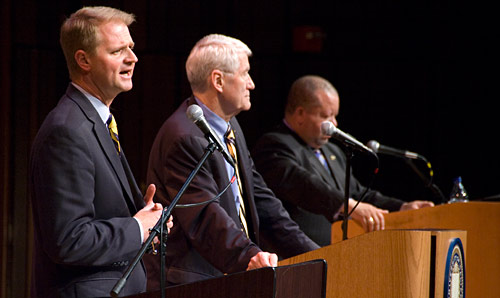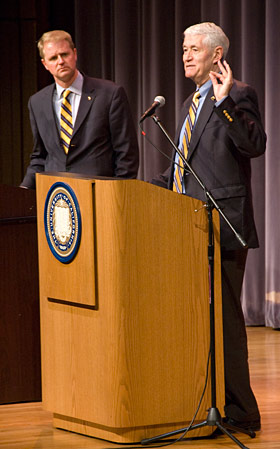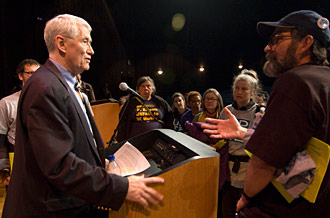 |
Nathan Brostrom, vice chancellor for administration, answers a question from the audience at Tuesday's staff forum. Joining him on the Wheeler Auditorium stage are Chancellor Robert Birgeneau and Vice Chancellor for Student Affairs Harry LeGrande, the moderator. (Steve McConnell/UC Berkeley photos) |
Campus leaders tell staff town hall they hope to minimize layoffs, but must close a 'huge funding gap'
| 24 March 2009
BERKELEY — More than 300 Berkeley staffers — with some 700 listening to a live webcast — met Tuesday with two of the campus's top executives to hear a message that California Hall has emphasized in several communications this month: In this "time of hardship and anxiety," as Chancellor Robert Birgeneau put it, the university is looking at every option to balance its budget with minimal pain for its employees.
The hourlong session in Wheeler Hall, led by Birgeneau and Vice Chancellor for Administration Nathan Brostrom, left no doubt that some pain is unavoidable, given a budget deficit projected to approach $70 million for the next fiscal year. And while many of the concerns voiced in the 40-minute question-and-answer session centered on staff reductions — and indeed some layoffs have already occurred and more are likely, they said — both Birgeneau and Brostrom stressed their firm intent to give priority to voluntary work-reduction programs to try to stem the need for large-scale layoffs.
 Chancellor Birgeneau, flanked by Vice Chancellor Brostrom, makes a point at the town hall.
Chancellor Birgeneau, flanked by Vice Chancellor Brostrom, makes a point at the town hall.As he's done before, Brostrom broke down the campus's growing budget deficit — the result of continuing state-funding cutbacks, drops in endowment and other revenues stemming from the nationwide economic crisis, and unfunded mandates like utilities and benefits costs — into temporary and permanent shortfalls. Assuming the campus generates $30 million in new revenues (including increased student fees) to offset an equal amount in unfunded mandates, he said, Berkeley will still need to find $15 million in temporary savings and another $25 million in permanent reductions in the coming fiscal year.
All campus departments have been directed to submit budget proposals that could yield 8 percent savings, steps that would total $25 million campuswide, he said. Additional temporary measures, including a staff hiring freeze and a slowdown in faculty hiring, are intended to forestall more drastic actions like more widespread forced layoffs.
"We do have to get to permanent savings," Brostrom said, "but hopefully, a lot of that can happen through the hiring freeze and attrition, and restructuring the way we deliver services."
The chancellor explained that campus leaders had hoped to implement a Berkeley-specific furlough program, but were told that the Office of the President first had to create "a legal framework" for such a plan. He said that he, like others in his senior-leadership group, favored the voluntary-furlough concept over pay cuts — an idea being considered by the UC Office of the President — "because that's something that can be reversed easily."
Additional pain, noted Birgeneau, will come in the form of employee contributions to the UC pension fund, which he said is "significantly underfunded."
"There's no ambiguity that all of us are going to have to start contributing again," he said, adding that the state contributes to both the California State University and community-college pension funds, but not to the UC Retirement Plan. That, he said, is "a fundamental political problem which must be reversed."
 After the public forum, the chancellor followed up on questions from members of several campus unions.
After the public forum, the chancellor followed up on questions from members of several campus unions."As for full disclosure, I think they should," he said. "I'm a strong believer in full transparency."
When another audience member said executive-level employees seem immune from cuts, Birgeneau replied that one deanship — in International and Area Studies — had just been eliminated, and "we are looking at other possible cutbacks" within the senior-management group.
Brostrom, responding to a question about rising costs for staff in the face of flat salaries, pointed to recently announced systemwide subsidies for healthcare premiums, and announced that campus parking rates "will not go up next year."
The noontime session was moderated by Vice Chancellor for Student Affairs Harry LeGrande.
An archived version of the webcast will be available starting tomorrow (March 25) at the campus's Budget Central website. Additional questions and answers from the session will be posted in the coming days at Budget Central. Staff were again invited to e-mail comments and ideas on the budget situation to budget@berkeley.edu.

